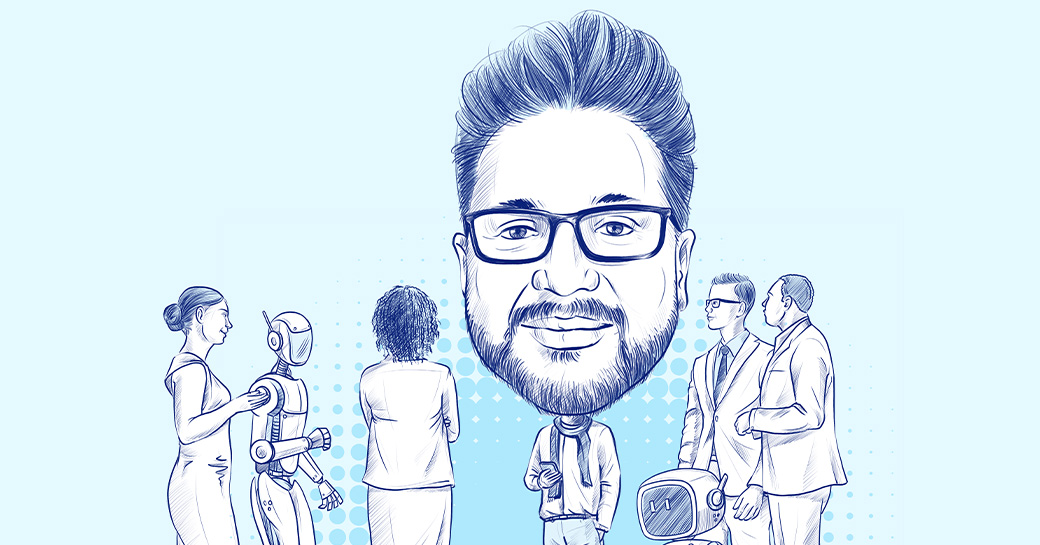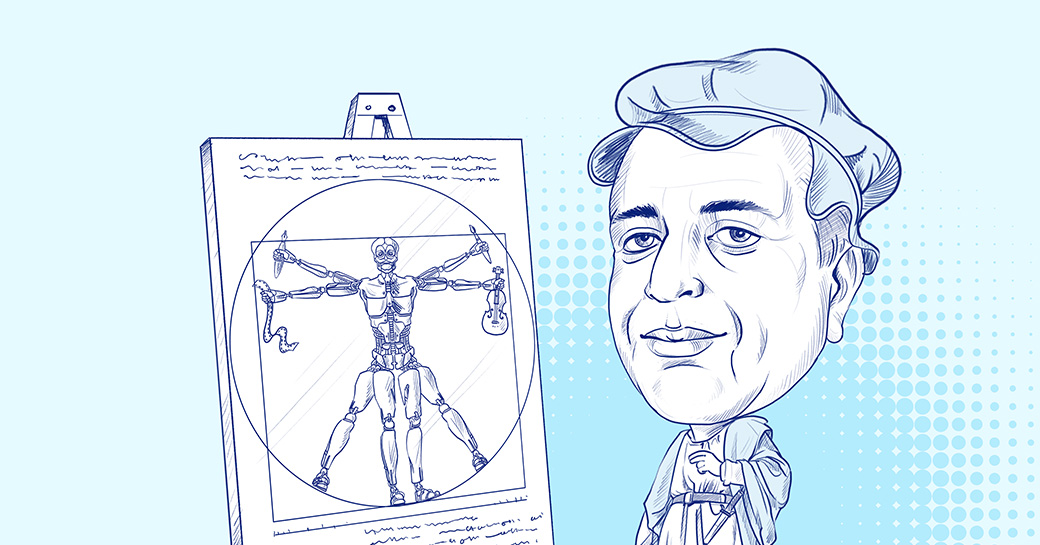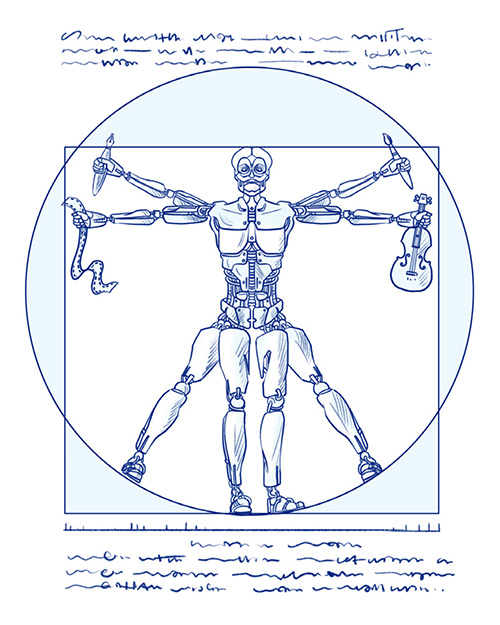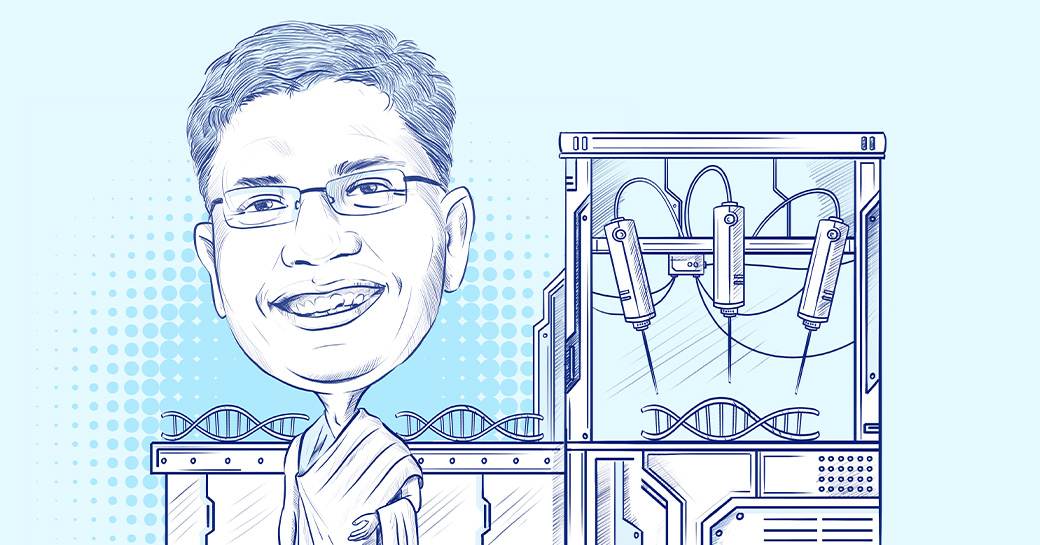Uncovering GenAI tools and infrastructure
Rajat Monga, Co-Founder, TensorFlow
Watch Now
5:12 Minutes The average reading duration of this insightful report.

Explore the intricate dance of genetic diversity and the power of thought in shaping human evolution. Discover how these fundamental elements intertwine, driving our progress for millions of years, and ponder the future role of AI in this evolutionary journey.
Explore a sneak peek of the full content
Genetic diversity is the cornerstone of evolution, with each organism’s unique genetic makeup contributing to a myriad of evolutionary outcomes. Natural selection streamlines these variations, a process highlighted by Charles Darwin, underscoring the endless possibilities in evolutionary biology. Download Complete Research
The intricate tapestry of evolution, weaving unique genetic threads into the fabric of life’s endless possibilities.
Thought diversity has emerged as a key evolutionary force, complementing physical genetics. It encompasses our cognitive abilities, emotions, and environmental interactions, leading to diverse human experiences and advancements in various fields like mathematics, literature, and music. This mental attribute significantly shapes our societal evolution. Download Complete Research
While genetics have been the driver for evolution so far, thought will be the driver for the evolution going forward.
As we integrate foundational AI models into the fabric of society, it is important to ensure that a limited set of thought processes are not standardized. Diversity in foundational models through the diversity of training scenarios that account for diversity in logic, emotions, race, gender, age, morals, likes, dislikes, etc. is critical. Diversity in foundational models is as important to evolution as diversity in human thinking.
While genetics and thought played an important role in our evolution, what attribute will play an equivalent role in AI of the future? Download Complete Research
Preserving diversity in AI is crucial to reflect the rich, multifaceted tapestry of human thought and evolution in our evolving digital counterparts.
Credits
Authors@lab45: Arvind Ravishunkar

6:23 Minutes The average duration of a captivating reports.

A digital revolution that democratizes content creation and fosters unprecedented self-expression, reshaping creativity and culture across the globe.
Generative AI is dismantling long-standing creative barriers caused by self-doubt, fear of judgment, and uncertainty. By harnessing AI, individuals can unlock their creative potential, transcending traditional limitations. Personal experiences, like finding solace in pottery during health struggles, exemplify creativity's transformative power in enhancing life. Download Complete Research
Generative AI is revolutionizing creative expression, offering endless possibilities for personal and cultural innovation. It facilitates the exploration of diverse ideas and concepts, transforming abstract thoughts into concrete creations. This technological leap promises an exciting future where creativity is only limited by imagination. Download Complete Research
The advent of generative AI heralds a new age of creativity and freedom of expression, accessible to all. As we venture into this new creative landscape, it's vital to use this power responsibly, fostering positive change and avoiding harmful stereotypes. The future shaped by generative AI holds unparalleled potential for humanity. Download Complete Research

Credits
Author@lab45: Nagendra Singh

05:32 Minutes The average duration of a captivating reports.

The current developments in the genetic engineering field suggest that we will soon have the capability to modify human behavior. This article explores the potential impact on society if humans adopt this technology en-masse.
Genes can influence behavior through various mechanisms. Some genes directly affect specific traits or behaviors, such as eye color or certain inherited disorders. Other genes may indirectly influence the structure and function of the brain, neurotransmitter systems, or other biological processes involved in human behavior. Twin and family studies have provided evidence for the heritability of certain behaviors. For example, studies comparing the behavior of identical twins (who share 100% of their genes) and fraternal twins (who share about 50% of their genes) have shown that some behaviors, such as intelligence or personality traits, have a higher concordance rate among identical twins compared to fraternal twins. This suggests a genetic influence on human behavior.
CRISPR (Clustered Regularly Interspaced Short Palindromic Repeats) is a revolutionary gene-editing technology that enables scientists to make precise modifications to the DNA of living organisms, including humans. Today the focus of CRISPR research in the medical field is primarily directed toward addressing genetic disorders and diseases where there is a clearer understanding of the genetic basis and potential therapeutic benefits. But it doesn’t rule out the possibility of its usage to modify genes that trigger “negative” emotions like anger, violence, greed, etc.
Let us, for a moment, not get into the ethical issues around this tech. But explore the what if. What will happen to the world if this technology goes mainstream? While genetics and thought played an important role in our evolution, what attribute will play an equivalent role in AI of the future? Download Complete Research
It reminds me of a story in ancient Hindu texts. According to the text, when God first created the universe. It was perfect in every way. There was no greed, ego, or jealousy; there were no “negative” emotions. There was positivity all around. Everyone was calm, patient, and compassionate. But this had unintended consequences.
In the absence of “negative” human emotions, everyone became “realized” quickly. There was no struggle, no divergent view, as no one saw any reason to disagree. As a result, most became renunciates without a desire to procreate or acquire possessions. This brought the chain of cause & effect to a halt, with no evolution.
The Gods realized the flaw in the design. They realized that friction is essential to forward movement. There is a need for “bad” to appreciate the “good.” Hence to rectify it, an opposing force was created. The universe and its beings evolve through the interplay of these opposing forces.
Returning to our topic, the story argues that imperfections are essential for human growth. Our weaknesses not only help us appreciate “perfect” attributes but also make us more accepting of the shortcomings of others. We also need the presence of bad to appreciate the presence of good. Without the Joker, who will understand Batman?
But there is an economic impact too. One of the basic principles of the economy is demand and supply. When one aspires for something they don’t have, it creates demand. Supply is created when a counterparty is willing to fulfill the need for a financial incentive.
In today’s world, the demand is created by both negative and positive emotions. Envy or pride makes us buy a bigger house, a better car, or a costlier watch. The entire stock market is driven by greed.
It channels this greed to create a capital market for companies. This capital helps to fund innovation and create better products & services.
In a new world order, people may go for utility over vanity. We may see lesser demand for luxury items but more for utility items. The thought of what is good for others may be a strong purchase driver. For example, there may be more demand for eco-friendly products. We may see less demand for products that exploit humans & animals. This will create a new economic model driven by compassion, not Consumption.
Art may be the biggest victim of this behavioral shift. Most incredible works of art, like the Great Pyramids, the Colosseum, etc., have been funded by wealthy individuals driven by base human emotions, not divinity. If the rich guys act & think like Buddha, they might prefer to build a bigger, more comfortable school but not embellish it like the Sistine Chapel. Creation will be more practical than beautiful. Download Complete Research
Negative emotions have also led to positive outcomes. If Gandhi hadn’t felt humiliated & angry being thrown out of the railway coach, he wouldn’t have fought for freedom from the Brits. Many great companies were created when their founders faced rejection & humiliation. Hence it is not the elimination of these emotions that matters but the channelization.
Credits
Author@lab45: Siddhant Raizada
This is your invitation to become an integral part of our Think Tank community. Co-create with us to bring diverse perspectives and enrich our pool of collective wisdom. Your insights could be the spark that ignites transformative conversations.
Learn MoreKey Speakers
Thank you for subscribing!!!
